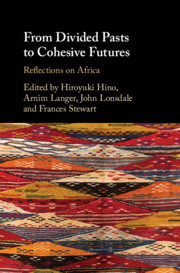Description
From Divided Pasts to Cohesive Futures
Reflections on Africa
Coordinators: Hino Hiroyuki, Langer Arnim, Lonsdale John, Stewart Frances
Offers an insightful yet readable study of the paths - and challenges - to social cohesion in Africa, by experienced historians, economists and political scientists.
Language: English
Subject for From Divided Pasts to Cohesive Futures:
Publication date: 08-2019
466 p. · 15.7x23.5 cm · Hardback
466 p. · 15.7x23.5 cm · Hardback
Description
/li>Contents
/li>Biography
/li>
Today, the cohesion of multi-ethnic societies is at risk across the globe. Throughout history, to the present day, African countries have been facing this challenge. Historical inequalities and social division undermine cohesion and sow seeds of instability. How can Africa build a future where ethnic and other differences are a strength, a driver of growth and development, rather than sources of division and instability? Drawing together historians, economists and political scientists, each an authority on Africa, this book delivers a comprehensive study of that question through an exploration of the continent's divided histories, to understand where Africans stand now, and to reflect on how they might now work towards a more trusting society. Numerous case studies, statistical expositions and theoretical reflections bring conceptual clarity to the often poorly understood processes and contexts of social cohesion, not only in Africa, but across the developing and developed world.
Introduction: understanding processes of change in social cohesion: learning from comparative history Hiroyuki Hino, Arnim Langer, John Lonsdale and Frances Stewart; Part I. Social Cohesion in Africa: Case Studies of Past and Present: 1. Kenya's four ages of ethnicity John Lonsdale; 2. Better elections, more deaths: Nigeria Abdul Raufu Mustapha; 3. Ethnicity, citizenry, and nation building in Tanzania Benno Ndulu, Emma Hunter and Wilfred E. Mbowe; 4. Identity, inequality, and social contestation in the post-Apartheid South Africa Hiroyuki Hino, Murray Leibbrandt, Ratjomose Machema, Muna Shifa and Crain Soudien; 5. Ethnicity, development, and social cohesion in Africa: overview Bruce J. Berman and Motoki Takahashi; Part II. Policies and institutions for social cohesion: 6. Redressing inequalities in societies: growth with equity Frances Stewart; 7. Vertical and horizontal decentralization for equity and stability Gustav Ranis; 8. Land reform: strengthening customary rights under community management Kojo Sebastian Amanor; 9. Protecting education from ethnic politics Eric Kramon and Daniel N. Posner; 10. Building social cohesion through education in Africa? Lessons from Côte d'Ivoire and Kenya Line Kuppens and Arnim Langer; 11. Remaking Cape Town: memory politics, land restitution, and social cohesion in District Six Ciraj Rassool; 12. Key ingredients of inclusive politics Abdul Raufu Mustapha; Part III. Conclusions and Policy Recommendations: 13. National cohesion in Africa: Beyond ethnicity and ethnic communities Ernest Aryeetey and Ama de-Graft Aikins; 14. From divided pasts to cohesive futures in Africa: conclusions and policy recommendations Arnim Langer and John Lonsdale.
Hiroyuki Hino is DUCIGS Fellow at Duke University and Visiting Professor at the University of Cape Town, where his field specialities are African economic development, social cohesion and poverty in Africa, and economic policies in Africa. He is a co-editor of Youth and Employment in Sub-Sahara Africa: Working But Poor (2013) and Ethnic Diversity and Economic Instability in Africa: Inter-Disciplinary Perspectives (Cambridge, 2012).
Arnim Langer is Director of the Centre for Research on Peace and Development (CRPD), Chair Holder of the UNESCO Chair in Sustainable Peacebuilding and Associate Professor of International Politics at Katholieke Universiteit Leuven, Belgium. In addition, he is currently holding an Alexander von Humboldt Fellowship for experienced researchers at Ruprecht-Karls-Universität Heidelberg. He has published numerous articles and book chapters on matters of ethnicity, inequality and conflict.
John Lonsdale is a fellow of Trinity College, University of Cambridge where he retired as Professor of Modern African History. He was co-winner of the Trevor Reece prize in Commonwealth history (1992) with co-author Bruce Berman, for Unhappy Valley: Conflict in Kenya and Africa (1992), he has co-edited and contributed to Mau Mau and Nationhood (2003); Writing for Kenya: The Life and Works of Henry Muoria (2009); Ethnic Diversity and Economic Instability in Africa (Cambridge, 2012); and S. H. Fazan's memoir, Colonial Kenya Observed (2015).
Frances Stewart is Emeritus Professor of Development Economics, University of Oxford. Her previous publications include Advancing Human Development: Theory and Practice (2018) with Gustav Ranis and Emma Samman; Horizontal Inequalities and Conflict: Understanding Group Violence in Multiethnic Societies (2008); and War and Underdevelopment, with E. V. K. Fitzerald and others (2001).
Arnim Langer is Director of the Centre for Research on Peace and Development (CRPD), Chair Holder of the UNESCO Chair in Sustainable Peacebuilding and Associate Professor of International Politics at Katholieke Universiteit Leuven, Belgium. In addition, he is currently holding an Alexander von Humboldt Fellowship for experienced researchers at Ruprecht-Karls-Universität Heidelberg. He has published numerous articles and book chapters on matters of ethnicity, inequality and conflict.
John Lonsdale is a fellow of Trinity College, University of Cambridge where he retired as Professor of Modern African History. He was co-winner of the Trevor Reece prize in Commonwealth history (1992) with co-author Bruce Berman, for Unhappy Valley: Conflict in Kenya and Africa (1992), he has co-edited and contributed to Mau Mau and Nationhood (2003); Writing for Kenya: The Life and Works of Henry Muoria (2009); Ethnic Diversity and Economic Instability in Africa (Cambridge, 2012); and S. H. Fazan's memoir, Colonial Kenya Observed (2015).
Frances Stewart is Emeritus Professor of Development Economics, University of Oxford. Her previous publications include Advancing Human Development: Theory and Practice (2018) with Gustav Ranis and Emma Samman; Horizontal Inequalities and Conflict: Understanding Group Violence in Multiethnic Societies (2008); and War and Underdevelopment, with E. V. K. Fitzerald and others (2001).
© 2024 LAVOISIER S.A.S.



